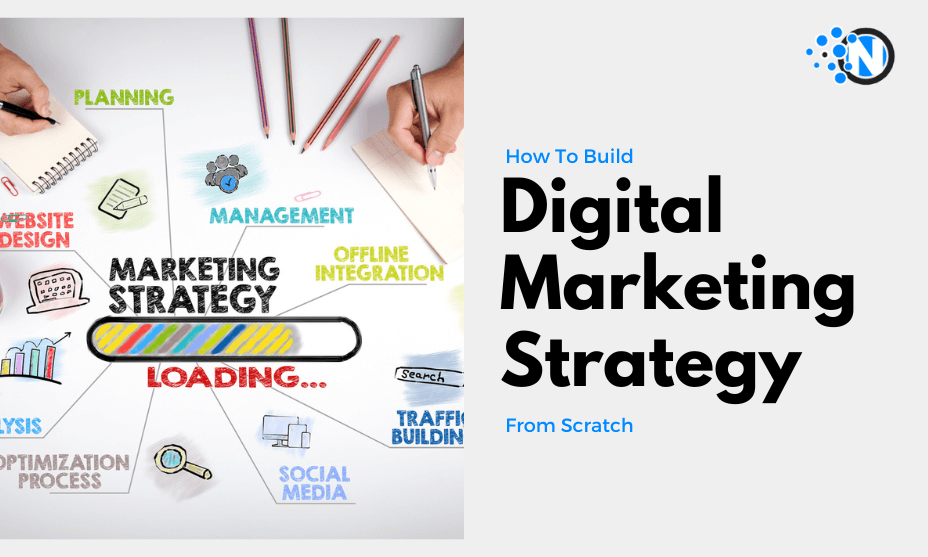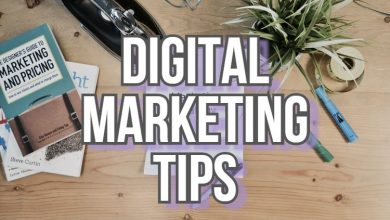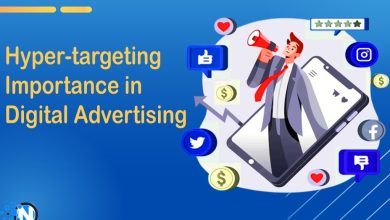How To Build a Digital Marketing Strategy from Scratch

As the competition across all industries is getting more saturated, a strong online presence is a must for any business size.
In fact, recent data revealed that 71% of businesses today have a website. So, to establish your brand as a leader, you need to build an excellent digital marketing strategy. Hereby, you will certainly generate credibility amongst your competitors when you promote your brand and create brand consciousness, reach your clients and generate sales as a result.
However, the case might be yours, the management of a start-up, and you have not even learned how to plan the digital marketing strategy from scratch. If that’s really what you are looking for, then you are in the right place. This post will give you a deeper insight into implementing a digital marketing strategy that will be the sole weapon in your armory, leading the way to the success of your online marketing efforts.
Step 1: Define your Goals And Objectives
Being a businessman, you realize, that any business plan has a notch-driver, that is your goals and objectives. The Personalization of the building of digital marketing strategy was same as that. During this stage, you have to ask the fundamental question: “What is it that you want to get from this? Are you looking for brand awareness only or sales? Are you looking for more prospects and big revenue and want to solve this issue immediately? Do you end up bypassing some of them or do you aim to accomplish all these goals as well as the others at the same time?
Remember, you should set SMART—specific, measurable, achievable, relevant, and time-bound goals. By clearly defining your goals based on these hallmarks, it’d now be easier for you to cultivate focus and measure your success in the long run.
Step 2: Choose your Digital Marketing Channels
Yes, you may be tempted to try all the digital marketing there is today. That is understandable because they make it very convincing that partnering with them will deliver the best results. But don’t be swayed. Worst case scenario, you’ll get into all these channels and spread your resources so thin that it’s not even productive for your business.
So, the best way to go is to evaluate each channel thoroughly, may it be website hosting, social media, email marketing, search engine optimization, pay-per-click advertising, content marketing, etc. During this evaluation, select those channels that align with your predetermined goals, your buyer persona, and, of course, your budget.
You would also benefit from professional help. Given that building a digital marketing plan is a new water for you, having a digital marketing agency on your side would be a great help. They can guide you on how to implement strategies that would deliver sure results. Remember, when in doubt, run to the experts.
Step 3: Get to Know Your Target Audience
Going headfirst into online marketing without knowing your target audience is a recipe for business failure. Of course, for any digital marketing strategy to succeed, understanding who you’re building this strategy for is another priority.
Therefore, you must conduct a thorough market research. Using the big data that is now highly accessible on the internet, gather valuable insights from potential customers. Look into the demographic that would benefit your products best.
If you intend to begin locally, make an effort to understand your community’s larger picture. Who would benefit most from your brand and solutions, and how do they solve a local pain point?
Having established your target market, the next step is to create a buyer persona. This is a made-up picture of your perfect client, complete with name, interests, demographics, and pain areas.
Why is this important? A buyer persona will serve as your constant reminder of where your efforts should focus. With this, you can make your digital marketing strategy, campaigns, and content more personalized, which would surely entice your target market.
Step 4: Analyze your Competitors
You can’t be an industry leader if you don’t know how your peers operate. This is the reason why benchmarking is another important stage when creating a digital marketing strategy. To do this, you can study their website, social media pages, content marketing approaches, and paid advertising campaigns.
Examine what they are good at and where they are falling short. As a result, you can craft a unique strategy that will differentiate your brand, maybe even do it better than your competition.

Step 5: Be Strategic With Your Content
Entrepreneurs know this all too well—content is king! This is especially true in the age where digital marketing drives more sales than conventional marketing techniques. Because of this, you need to think through every piece of content you release for your audience carefully because it has the power to make or ruin your efforts.
Your content plan should outline the types of content you’ll create (blog posts, videos, infographics, whitepapers, etc.), the topics you’ll cover, and the frequency of publishing. Always remember to keep your content interesting while yet being educational and instructive. After all, you are trying to reach the pulse of your target market.
Step 6: Optimize your Website
Think of your website as the door that connects your business with your potential customers. Since it is on the frontline, it must be user-friendly and visually appealing. Make your website interactive by using elements like dropdown options, dialogue boxes, or even chatbots to answer queries about your offering.
However, having an excellent interface would be futile if it’s not optimized for search engines. To optimize your website, you can apply SEO best practices, such as keyword research, on-page optimization, and technical SEO. This would then result in a top-notch user experience, and sales would follow thereafter.
Step 7: Embrace Social Media
With over 4.59 billion people using social media today, the possibilities are endless, especially for businesses. Many are moving their processes digitally, so social media is transformed to be an amazing marketing tool.
Looking back to your buyer persona, you learned which social media platforms your customers use frequently. Use this knowledge to strategize how to engage with them with more.
What you post on your website can also be shared on your social media pages. Your customers will then be redirected to your main portal. Because your content is highly shareable, you can also gain new customers on your roster.
Step 8: Don’t Forget Email Marketing
Email marketing should still be a part of any digital marketing plan even though it can appear outdated. It can be a very powerful tool for nurturing leads, fostering relationships, and increasing conversions when done correctly. In fact, according to statistics from 2023, 77% of marketers reported more email engagement. This demonstrates the continued effectiveness of email marketing.
To incorporate this into your plan, begin by creating an email list using opt-in forms, lead magnets, and other methods, and then create a sequence of email campaigns that are suited to distinct phases of the customer journey. From welcome emails to newsletters and special offers, a well-thought-out email marketing strategy can maintain your company at the forefront of the industry and produce steady results.
Don’t, however, merely rely on pre-written emails. Using your buyer profile as a guide, personalize it more. Merely mentioning their name has the potential to significantly increase sales.
Step 9: Consider Paid Advertising
Since organic traffic is the golden goose of digital marketing, sometimes the money you invest in paid ads may be your go-to solution. Tools such as Google Adwords, social media marketing and remarketing are capable of letting you reach new visitors and boost conversion rates.
Nevertheless, paid advertising needs to be done with a balanced plan. Have explicit goals, define your spectators, and monitor the effectiveness of your projects and fix them in necessary areas.
Conclusion
With this knowledge, you can now develop a digital marketing plan. You have all the necessary knowledge, from setting your objectives to selecting the best campaign tactics. However, your approach need not be restricted to this list. Your greatest asset as an entrepreneur is your creativity, which you can use to propel your company to success.




